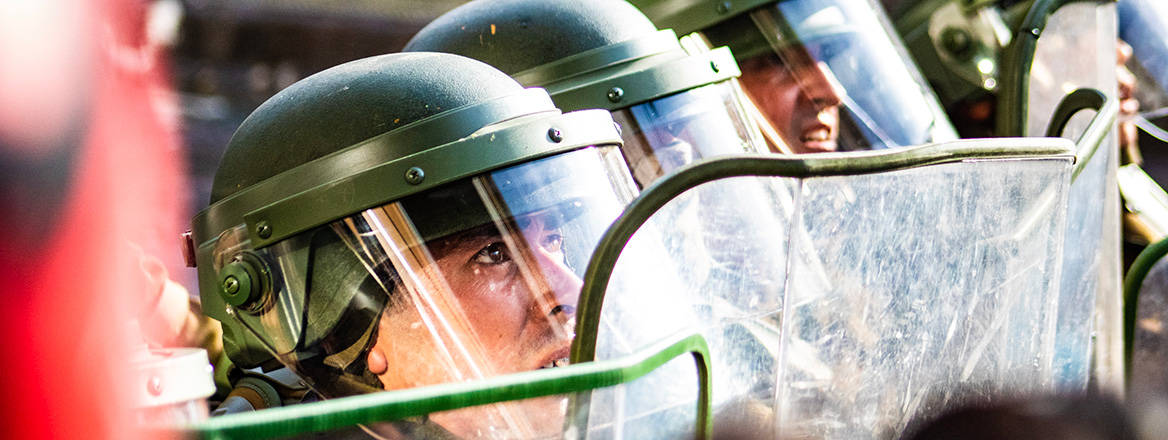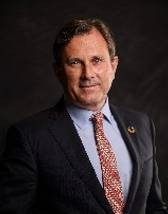Law and Disorder: The Unenviable Dilemma Facing Chile’s Police Forces
Chilean public prosecutors will charge the chief of the national police for his involvement in anti-riot operations during Chile’s 2019 social uprising. This could cost the country dearly in its fight against delinquency and organised crime.
On the evening of 18 October 2019, Chile was plunged into chaos. Simultaneously, several underground stations were set on fire, riots started in different parts of the country, and more worryingly still, nobody quite knew why this was happening. The national police, the Carabineros – a militarised national police force that is soon to celebrate its centennial – were overwhelmed and incapable of controlling what was happening. Then-President Sebastián Piñera put Chile in a state of emergency and handed control of major cities to the armed forces for approximately 10 days. Things did not calm down until mid-November, when an agreement was reached with the leaders of the opposition and of those that were out on the streets. Ultimately, it was only the Covid-19 pandemic that brought the unrest to an end.
At the time of the social revolt, the Carabineros’ current chief, Ricardo Yañez, was the force’s operations director, leading the anti-protest actions against the disorder taking place on the streets. Prosecutors say he was responsible for the police abuses and human rights violations that took place, including cases of people that lost their lives – something that human rights organisations agree with, but not the rest of Chile.
Logic dictates that, regardless of the underlying reason, General Yáñez must resign from the leadership of the Carabineros if his presence generates a conflict between the executive and the public prosecution office. The current internal security situation in Chile does not allow for a battle for power between two of the authorities in charge of solving the crime problem. They should be working together and focusing on reducing crime, the number one issue worrying people in Chile and one which Chileans don’t feel the government is doing enough about.
The Prosecution
We shouldn’t mischaracterise Chile’s public prosecution office: it is not an independent arm of the state, but an autonomous body whose mission is ‘to direct the investigation of crimes, bring the accused to court, if appropriate, and provide protection to victims and witnesses’. It does not generate judicial rulings, and can clearly make mistakes. More importantly, due to insufficient capabilities, it does not pursue all crimes; rather, it selects the most important ones or the cases in which it is obvious that it must act.
As in Hollywood movies, the prosecution office has a lot of politics, and it is normal for its work to be recognised by some and criticised by others. There is only one main boss, the chief national prosecutor Ángel Valencia, to whom the regional prosecutors do not always pay attention. They can sometimes get carried away as a result, as is common with regional prosecutors such as Ximena Chong and Xavier Armendáriz, who more often than not show their left-wing or progressive inclinations when dealing with cases such as this one, in which they’ve indicated that in May 2024 they will formally press charges against General Yáñez. In a public statement, Yáñez’s lawyers argued that both prosecutors have shown ‘enmity, hatred or resentment’ against the Carabineros in the past.
It should be remembered that the police carried out the orders of the interior ministry and the president at the time; they didn’t take decisions themselves
When asked about the criticisms of the public prosecution service following the legal proceedings against General Yáñez, chief prosecutor Valencia responded that it was common for there to be diverse opinions on sensitive cases. ‘In my role as the national prosecutor, it is not within my purview to express an opinion on its content (...) in a democratic country like ours, it is healthy, just and necessary that institutions like the public prosecution service can also be subject to criticism, and that we listen to them and evaluate them internally or externally as appropriate’, he added. Unfortunately, being autonomous means that the prosecution office has little incentive to listen to criticism or improve its processes and procedures.
A Blow to Anti-Delinquency Efforts?
The Carabineros faced the 2019 social unrest with the human and material resources they had, with procedures more suited to preventing crimes, persecuting criminals and dealing with medium-sized street disorders. They were not prepared, and it seems that nobody was, to face a nationwide outbreak of social unrest that mixed genuine social demands with the actions of criminals and delinquents of the worst kind, who saw an opportunity for looting, destroying and stealing.
It should be remembered that the police carried out the orders of the interior ministry and the president at the time; they didn’t take decisions themselves. They went out to restore order and public security, which had largely vanished. Like any human organisation, they are capable of make mistakes, especially considering the chaos back then. But there is a big leap from acknowledging this fact to categorising police leaders as criminals. On this matter, chief prosecutor Valencia has so far only cared for his own people, but has not said anything further, and nor have the political authorities of the time assumed any responsibility for the actions of the law enforcement and public security forces they commanded. It is one thing for General Yáñez to resign and be replaced by one of the many other good generals that the Carabineros have, but quite another for the current government, prosecutors, politicians and Chileans in general to expect that the day after Yáñez's resignation, the Carabineros will simply stand by as if nothing had happened.
Regardless of whether it is a hierarchical, disciplined and obedient organisation, the resignation of its general director will not be without consequence, and this could cost Chile dearly in its fight against delinquency and organised crime, the biggest security problem facing the country today.
There is no doubt that the ‘2024 threat’ for Latin America will be transnational organised crime, as its effect on societies is contagious
In November 2023, the national urban citizen security survey released by the government indicated that the perception of insecurity in Chile had reached 90%, the highest level in a decade, reflecting the ‘security crisis currently experienced by the South American country’. Soon after, three opposition mayors delivered a letter to President Gabriel Boric urging him to declare a state of emergency in Santiago following a November with high homicide figures. According to a survey, 54% of Santiago residents agreed with taking such a measure. Nationwide, 60% believed that crime should be the main priority in 2024, followed by 35% who wanted a focus on the economy.
Conclusion
Crime is something that needs all parties involved to be on the same page, and prosecuting the head of the police does not help. This is an important matter for Chileans because it is impacting their daily life. They have seen a move from thefts to kidnappings, assassinations, assaults and narcotrafficking. There are parts of towns that are controlled by criminal organisations, several of which have come from Colombia, Brazil, El Salvador and Venezuela, according to the authorities and experts.
There is no doubt that the ‘2024 threat’ for Latin America will be transnational organised crime, as its effect on societies is contagious. A recent poll survey showed that 54% of Chileans believe that a ‘rebellion of organised crime’ like that in Ecuador is likely to occur in the country. In total, 82% of Chileans stated that they agree with Ecuadorian President Daniel Noboa’s decision to impose a curfew and military presence on the streets for two months to curb the security crisis. In only five years, the homicide rate in Ecuador has increased by approximately 800%, reaching 46 per 100,000 inhabitants. Chile’s President Boric, meanwhile, has struggled to meet his pledge to stop crime. In the same survey, the approval rating for Boric was 32%, while one of the most popular political figures was Evelyn Matthei (62%), a right-wing presidential hopeful for 2026.
Chile used to be a nice country to live in – in a sense, much better than its neighbours. People want the military back on the streets; they want a state of emergency; and they want a strong hand in charge, something that the current government has not been able to provide. In such an environment, replacing the head of the Carabineros is not a good idea, especially if it impacts their efficiency and effectiveness.
The views expressed in this Commentary are the author’s, and do not represent those of RUSI or any other institution.
Have an idea for a Commentary you’d like to write for us? Send a short pitch to commentaries@rusi.org and we’ll get back to you if it fits into our research interests. Full guidelines for contributors can be found here.
WRITTEN BY
Richard Kouyoumdjian Inglis
RUSI Senior Associate Fellow, International Security
- Jim McLeanMedia Relations Manager+44 (0)7917 373 069JimMc@rusi.org


